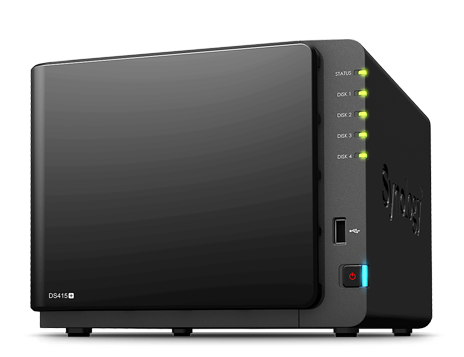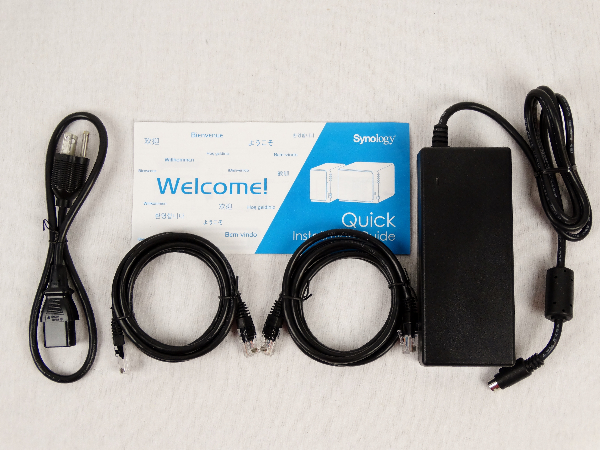Early Verdict
The DS415+ gives users solid storage performance but lacks many of the new features found on competitor's products. Synology does offer systems with the bells and whistles, this one just has a tighter focus on its storage
Pros
- +
Storage performance is the focus of the DS415+ and it performs well at this task. The setup process is very easy for first time NAS appliance users and there are enough extras for users to be surprised by all of the functions available.
Cons
- -
Without the bells and whistles offered by some of the competing products in this price range we think the DS415+ is a bit overpriced.
Why you can trust Tom's Hardware
Specifications, Pricing, Warranty & Accessories
Most of Synology's products don't include a lot of fancy add-ons that distract you from what a NAS is actually for. The company's DS415+ is no exception. If you need a product to store data, this is a solid choice in the vast sea of competing four-bay products.
Synology has used the (admittedly classy-looking) DS415+ case design for many years now. Its feature set hasn't changed much either. Evolutionary steps from Synology are decidedly incremental in nature. Advances usually come from the internals, with heavy reliance on Intel to push new technology.
Over the past five years, we've seen other appliance manufacturers go off the deep end with new bells and whistles tacked on to their small and medium network-attached storage servers. And we sometimes find ourselves wondering what we are actually looking at: a NAS device, a media center or a desktop replacement?
Synology doesn't give us any issues there. When you buy one of its products, you're getting a storage appliance. With its laser-sharp focus, the company does networked storage really well.
Specifications
The DS415+ uses Intel's quad-core Rangeley design that was rolled into the Atom family of SoCs. Rangeley and its sister processor Avoton contain Silvermont cores. The duo is used in digital signage, light application servers, network products like routers and, as shown today, in an SMB NAS. With a maximum thermal design power (TDP) of just 15 watts, the 2.4GHz quad-core processor delivers a lot of performance in a very small power envelope.
MORE: All Storage ArticlesMORE: Latest Storage News
MORE: Storage in the Forums
Rangeley supports up to 64GB of system memory, but Synology loads the DS415+ up with just 2GB of DDR3 via a single SO-DIMM slot. Moreover, the company doesn't build in an easy-access trap door for upgrading the RAM. Should you decided to dig in to swap that module out, expect to void your warranty.
Get Tom's Hardware's best news and in-depth reviews, straight to your inbox.
The DS415+ supports Synology Hybrid RAID along with RAID 0, 5, 6 10 and JBOD. There are four hot-swappable tool-free drive trays and an eSATA port on the back for expansion. On this specific model, you can't use eSATA to increase the capacity of the internally-configured volume, unfortunately. Most users with four drives available for an array use RAID 5. Synology's Hybrid RAID is also an option, allowing you to swap drives in a live environment to increase capacity. Just make sure the previous rebuild is finished before moving on to the next drive. Synology Hybrid RAID works like RAID 5 when single redundancy is selected. And you only get one option for the array's file system: EXT4.
Technically, SSD caching is supported to accelerate random read operations. It's unlikely that you'll use this feature, but it is possible to run three hard drives in RAID 5 with solid-state storage serving as cache. You can read Synology's SSD Cache white paper here. We don't test SSD cache performance on systems with fewer than seven drive bays, but we do look forward to reviewing one of Synology's larger platforms with SSD cache enabled in the future.
You also get access to two USB 3.0 ports on the back of the DS415+, along with a single USB 2.0 port on the front. There isn't a one-touch copy button on this model, but it is possible to back up data from USB-connected devices.
Network I/O comes from two gigabit Ethernet ports that can run independently or teamed with 802.11ad link aggregation. Synology includes support for other teaming technologies that don't require special network switches. With those options combined, users should see sequential file transfers greater than 200 MB/s.
Price, Warranty & Accessories
We found Synology's DS415+ at Newegg and Amazon for $578, and available from other e-tailers for more. The price is comparable to competing four-bay systems.
Synology's warranty covers NAS products for two years. As we've said before, we would like to see the industry transition to five years or more, as these systems generally stay in use for five to 10 years. The two-year coverage is standard across this segment though, so we can't fault Synology.
Synology includes an external power brick, a power cord, two Ethernet cords and a quick installation guide. The drive sleds are tool-free, but the system also comes with screws for mounting 2.5-inch drives.

Chris Ramseyer was a senior contributing editor for Tom's Hardware. He tested and reviewed consumer storage.
-
Rookie_MIB Nothing wrong with focusing on having an appliance do it's primary task (storage) and do it well. Most people will set up a NAS device and just leave it to do it's job silently in a corner or a closet somewhere for a few years.Reply
As long as it's capable of performing that job, then I would call it a good product. -
BoredSysAdmin I learned from my mistakes, maybe you should learn from my and don't touch synology (especially in business environment) with a ten foot poleReply
http://www.boredsysadmin.com/2015/10/a-bit-of-insight-into-synology-or-why.html -
HideOut WHy wouldnt you just get a buffalo 441e @ under $200. Its not as powerful but for home users you need nothing more. No home user should be spending over $500 on a bare box. Thats nuts.Reply -
milkod2001 ZyXEL NAS540Reply
With 1.2 GHz dual-core CPU and 1 GB of DDR3 RAM, The two Ethernet LAN ports for under €150 would probably piss all over this.
Would love to see this unit reviewed. By specs and price it looks like really good value for average home user.

